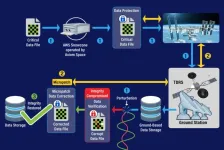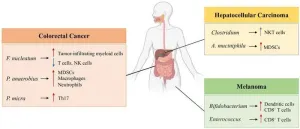(Press-News.org) Scientists from the German Cancer Research Center (DKFZ) and the Cambridge Stem Cell Institute have developed an AI system that recognizes and characterizes white and red blood cells in microscopic images of blood samples. The algorithm can help physicians diagnose blood disorders and is available as an open source method for research purposes.
Blood disorders are often characterized by altered numbers and aberrant shapes of red and white blood cells. To diagnose the diseases, physicians classically examine blood smears on a slide under a microscope. This type of diagnosis is straightforward, but evaluation by experienced experts is difficult because the changes are sometimes very inconspicuous and affect only a few of the tens of thousands of visible cells.
Due to these difficulties, the differentiation of diseases is not always easy. For example, the visible changes in the blood of patients with myelodysplastic syndrome (MDS), an early form of leukemia, often resemble those of much more harmless forms of anemia. The definitive diagnosis of MDS therefore requires additional more invasive procedures, such as analysis of bone marrow biopsies and molecular genetic testing.
"To support specialists in these difficult diagnoses, we have developed a computer-based system that automatically recognizes and characterizes white and red blood cells from peripheral blood," explains Moritz Gerstung of DKFZ. Gerstung and colleagues first trained the algorithm, called Haemorasis, to recognize the cell morphology of more than half a million white blood cells as well as many millions of red blood cells from more than 300 individuals with different blood disorders (various anemias and forms of MDS).
"The algorithm is able to detect the shape and number of tens of thousands of blood cells in a microscopic image of the blood. This complements human capabilities, which are typically more focused on detail," Gerstung says. Using the trained knowledge, Haemorasis can now suggest diagnoses of blood disorders and even distinguish genetic subtypes of the diseases. In addition, the algorithm also reveals concrete correlations between certain cell morphologies and diseases, which are often difficult to find because of the large number of cells involved.
Haemorasis has already been tested on three independent groups of patients to demonstrate that the system also works in other test centers and blood count scanner systems "We have now demonstrated for the first time that computer-assisted analysis of blood images is possible and can contribute to initial diagnosis," explains Gerstung. Haemorasis is designed to facilitate diagnostics in hematology and can help make a more accurate initial diagnosis of blood disorders. This is important for identifying those patients who require more invasive testing, such as bone marrow punctures or genetic analysis.
"Automated cell analysis with Haemorasis could complement routine diagnosis of blood disorders in the future. So far, the algorithm has only been trained on specific diseases - but we still see great potential in this approach," Gerstung says. He stresses that further studies are needed to identify potential limitations of the method.
Haemorasis is available as an open-source method for research purposes and is straightforward to use.
Publication: José Guilherme de Almeida, Emma Gudgin, Martin Besser, William G. Dunn, Jonathan Cooper, Torsten Haferlach, George S. Vassiliou & Moritz Gerstung: Computational analysis of peripheral blood smears detects disease-associated cytomorphologies. Nature Communications 2023, DOI: https://doi.org/10.1038/s41467-023-39676-y
With more than 3,000 employees, the German Cancer Research Center (Deutsches Krebsforschungszentrum, DKFZ) is Germany’s largest biomedical research institute. DKFZ scientists identify cancer risk factors, investigate how cancer progresses and develop new cancer prevention strategies. They are also developing new methods to diagnose tumors more precisely and treat cancer patients more successfully. The DKFZ's Cancer Information Service (KID) provides patients, interested citizens and experts with individual answers to questions relating to cancer.
To transfer promising approaches from cancer research to the clinic and thus improve the prognosis of cancer patients, the DKFZ cooperates with excellent research institutions and university hospitals throughout Germany:
National Center for Tumor Diseases (NCT, 6 sites),
German Cancer Consortium (DKTK, 8 sites)
Hopp Children's Cancer Center (KiTZ) Heidelberg
Helmholtz Institute for Translational Oncology (HI-TRON Mainz) - A Helmholtz Institute of the DKFZ
DKFZ-Hector Cancer Institute at the University Medical Center Mannheim
National Cancer Prevention Center (jointly with German Cancer Aid)
The DKFZ is 90 percent financed by the Federal Ministry of Education and Research and 10 percent by the state of Baden-Württemberg. The DKFZ is a member of the Helmholtz Association of German Research Centers.
END
Computer-aided cell analysis for faster diagnosis of blood diseases
2023-08-10
ELSE PRESS RELEASES FROM THIS DATE:
National QIS Research Centers to host virtual career fair
2023-08-10
UPTON, NY– Registration is now open for the third Quantum Information Science Career Fair hosted by the U.S. Department of Energy (DOE) Office of Science’s National Quantum Information Science (QIS) Research Centers. The virtual event takes place on Wednesday, Sept. 13.
The event aims to make undergraduates, graduate students, postdocs and early-career professionals aware of the wide range of QIS careers they can pursue—including technical and scientific roles as well as positions that facilitate research and bring awareness to the field, such as ...
Enhanced gut microbiome diversity linked to improved survival in children receiving stem cell transplants
2023-08-10
(WASHINGTON, August 10, 2023) – Researchers in Italy have shown for the first time that among children who have undergone a donor stem cell transplant, the presence of diverse species of micro-organisms in the intestinal tract before the transplant resulted in significantly better overall patient survival and fewer complications. The study, published today in the journal Blood, adds to a growing body of research unraveling the role gut health plays in health outcomes.
“Our study provides the first evidence of a relationship between pre-transplant microbial diversity in the intestinal tract and post-transplant ...
SwRI micropatch algorithm improves ground-to-spacecraft software update efficiency
2023-08-10
San Antonio – August 10, 2023 – Southwest Research Institute developed an algorithm to remotely update and repair spacecraft software using less time and data than conventional techniques.
The tool not only improves the overall efficiency of satellite software transmissions but also can recover data from failed over-the-air updates and malicious cyberattacks. It works by identifying missing bytes and other errors before deploying a custom “micropatch” to the damaged or missing software.
“Instead of updating an entire file or operating system, which is typically required with over-the-air satellite software updates, our ...
Study ties fracking to another type of shaking
2023-08-10
New research confirms fracking causes slow, small earthquakes or tremors, whose origin was previously a mystery to scientists. The tremors are produced by the same processes that could create large, damaging earthquakes.
Fracking is the high-pressure injection of fluids underground to extract oil and natural gas. Though it is typically done with wastewater, this study examined data from fracking with liquid carbon dioxide. The process pushes carbon underground and keeps it from trapping heat in Earth’s atmosphere.
By some estimates, carbon dioxide fracking could save as much ...
Good Clinical Trials Collaborative and leading clinical trial networks join forces to improve clinical research in low resource settings
2023-08-10
London, United Kingdom, 10 August 2023 – Four major clinical trial networks based in low resource settings are embarking on an exciting partnership with the Good Clinical Trials Collaborative (“GCTC”) to enhance clinical research in low resource settings. By promoting the unique qualities of randomized controlled trials (RCTs) and the evidence they produce, the collaboration aims to support regional research ecosystems to prioritize collaborative, informative and efficient research responses to public health challenges.
ADVANcing Clinical Evidence in Infectious Diseases (“ADVANCE-ID”), Africa ...
Gastrointestinal viruses all but disappeared during COVID—but surged back two years on
2023-08-10
Washington, D.C. – Following the first stay-at-home orders issued in the U.S. to curb the spread of COVID-19, gastrointestinal viruses such as norovirus, rotavirus and adenovirus all but disappeared from California communities, and remained at very low levels for nearly 2 years. The research is published in the Journal of Clinical Microbiology, a journal of the American Society for Microbiology.
Interestingly, these viruses surged back to pre-pandemic levels in late 2022, said Niaz Banaei, M.D., professor of Pathology and Medicine (Infectious Diseases), Stanford University, and Medical Director of Clinical Microbiology Laboratory, Stanford Health Care. “Adenovirus ...
Measuring communication experiences of families of inpatients unable to make decisions for themselves
2023-08-10
INDIANAPOLIS – As the population of the United States grows older, more and more family members will be called upon to make medical decisions during hospitalizations of those who cannot make decisions for themselves. Good quality, focused, empathetic and timely communication between family members and clinicians is essential for good decision-making.
Researcher-clinicians from Regenstrief Institute and Indiana University School of Medicine developed the 30-question Family Inpatient Communication Survey (FICS) to measure the experience of communication with hospital staff from the perspective of family members of seriously ill patients unable ...
Research details perils of not being attractive or athletic in middle school
2023-08-10
Despite the many changes in school culture since the 1960s, a new study reveals that some things never change: life is harder for middle school students who are not attractive and for those who are not athletic.
As children head back to school, the first-of-its-kind longitudinal study by Florida Atlantic University helps to explain why adolescents who lack traits valued by peers are at risk for adjustment difficulties.
Results, published in the Journal of Youth and Adolescence, show that low attractive ...
Gut microbiota and immune alteration in cancer development: implication for immunotherapy
2023-08-10
A vast number of microbes colonizes the human body to form an ecological community known as the microbiota. Microbiota are made up of bacteria, viruses, fungi, and archaea. These microbes are closely associated with the physiology and function of the human body. The gut microbiota has received tremendous research attention with the recent advance in metagenomic sequencing.
Under normal conditions, the gut microbiota is maintained in homeostasis, yet it is readily affected by various environmental factors, including diet and use of ...
Diabetes linked to functional and structural brain changes through MRI
2023-08-10
The longer a person has type 2 diabetes, the more likely they may be to experience changes in brain structure, a Michigan Medicine study finds.
Researchers analyzing data from 51 middle-aged Pima American Indians living with type 2 diabetes used a series of memory and language tests developed by the National Institutes of Health, called the NIH Toolbox Cognitive Battery, as well as MRI, to determine the relationship between diabetes, cognition and makeup of the brain.
Brain imaging suggested that study participants with longer durations of type 2 diabetes had decreased mean cortical thickness ...




